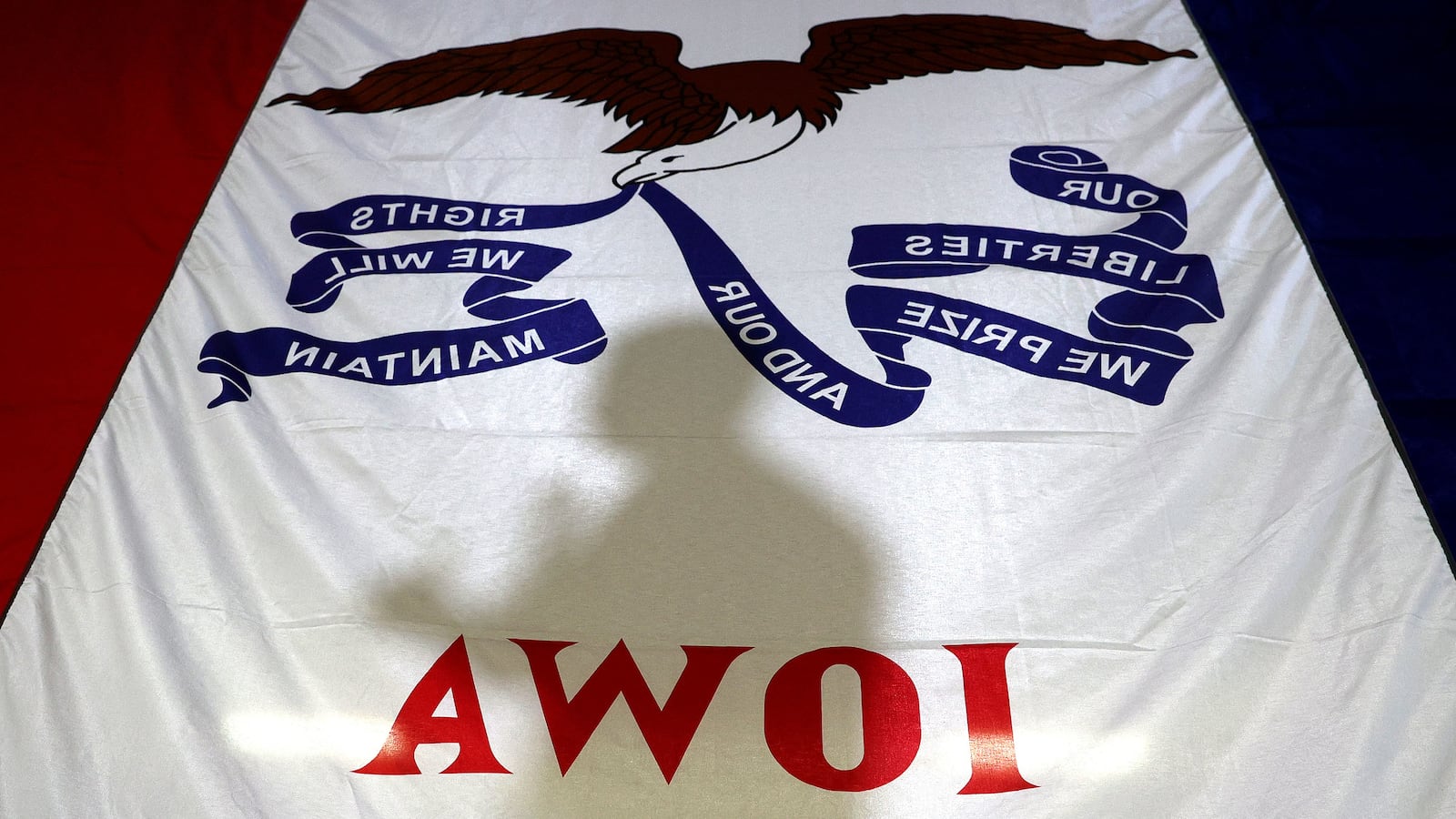The progressive digital advocacy group Acronym has, in a short period of time, become one of the most influential and lavishly funded political machines in Democratic politics. But it took the implosion of one of its key portfolio companies for the American people to finally get some insight into the byzantine way in which it operates.
“Coding errors” in the app developed to tabulate votes at Monday’s Iowa caucuses by one of the companies in the Acronym umbrella—the digital startup Shadow Inc.—compounded delays and confusion in the Democrats’ first presidential nominating contest. And while Shadow has suffered potentially irreparable reputational damage as a result, the fiasco has also blown back on Acronym, its top investor.
On Wednesday, Acronym Chief Executive Tara McGowan penned an open letter defending her group, a “dark-money” nonprofit that’s worked since 2017 to help build Democrats’ digital infrastructure. “We have literally nothing to hide,” she said in a thread of tweets about the Iowa fallout.
McGowan’s post on the website Medium laid out some of the details behind the structure of Acronym, its sister organizations, and its clients and portfolio companies. The post came as journalists tried to decipher the often murky relationships between those various nodes in what the group itself has described as “the Acronym umbrella.”
PAY DIRT readers know that we’ve been following Acronym for the better part of a year, long before the group found itself at the center of a 2020 campaign firestorm. A component of that reporting has sought to clearly identify those relationships and how they interact with and complement each other as the group seeks to remake Democratic digital politics.
For a group with nothing to hide, Acronym tends to make those various links a bit dizzying. So we’re going to do our best to explain as much of the structure as we can.
At the core of Acronym’s structure are three entities: the group itself is a 501(c)(4) “dark-money” nonprofit, which is not required to disclose its donors. The group’s most recent publicly available annual tax filing, which covers May 2017 through April 2018, redacted the names of 12 of its top donors, who collectively gave nearly $1.3 million.
We can identify some of those donors from other public records. Filings with the Federal Election Commission show that Acronym has received $300,000 from House Majority PAC, a Democratic super PAC; $135,000 from NextGen Climate Action, Democratic presidential candidate Tom Steyer’s political group; and $25,000 from the PAC run by former Congresswoman Gabby Giffords.
As that tax filing makes clear, and as McGowan explained in her open letter, Acronym is the sole shareholder of a political consulting firm, Lockwood Strategy, that is integral to the group’s work. The firm has done extensive digital advocacy for a host of Democratic political organizations, including Planned Parenthood—its first client, McGowan told an interviewer in late 2018—and super PACs Change Now and Win Justice. Lockwood also worked last year with House Majority Forward, a Democratic dark-money group, to help hone the party’s messaging in 10 key 2020 House races.
Because Lockwood is a wholly owned subsidiary of the nonprofit, it cannot legally pass along the money it makes directly to shareholders, as a more traditional for-profit entity might. Rather, its profits pad the budget of Acronym itself, allowing the group to expand its operations.
“I don’t want to get into how I feel about capitalism, I’m certainly not a capitalist by any means,” McGowan said in that 2018 interview, but “I really felt that for-profit companies and for-profit incentives, while I had absolutely no problem with them in the world… [were] preventing us, preventing the progressive movement, from getting smarter and more innovative and more nimble around voter contact and communication.”
Operating parallel to Acronym and Lockwood is a super PAC dubbed Pacronym, which, unlike the nonprofit, can engage directly—and without limits—in direct political activity. That group raised nearly $8 million last year from a stacked roster of Democratic donors, including George Soros (by way of a super PAC he personally finances), Steven Spielberg, Jeffrey Katzenberg, hedge funders Seth Klarman and Don Sussman, Levi Strauss heiress Mimi Haas, and a host of others.
Between Acronym, PAcronym, and Lockwood, McGowan’s network can fulfill a host of various roles using its different nodes; each of their legal structures fits with a different model of advocacy and communications. Together, they form the core of what McGowan pledged would be a $75 million digital push in the run-up to the 2020 election.
Here’s how McGowan’s Medium post describes its relationship with Shadow: “In early 2019, Shadow was formed with Acronym as its lead investor… [T]he company is a distinct for-profit entity, which builds political campaign technology. The company has other private investors too. Shadow also has its own board of directors. When it comes to day-to-day operations, Shadow and its full-time employees operate independently from Acronym.”
That’s a bit different from how Gerard Niemira—Shadow’s CEO and, according to its website, Acronym’s CTO—described the relationship in a post announcing the partnership.
“Acronym is thrilled to announce the launch of Shadow, a new technology company that will exist under the Acronym umbrella,” Niemira wrote. “As part of the launch of Shadow, Acronym has acquired Groundbase, a peer-to-peer SMS and CRM tool that helped 75 progressive organizations and campaigns win elections during the 2018 cycle… As part of Shadow’s technology suite, Acronym will continue to license Groundbase technologies to campaigns and organizations across the progressive movement.”
Niemira made it sound like Acronym was far more than an investor with no operational control. And that’s exactly what one insider said in the wake of Monday evening’s Iowa debacle. “According to my source [an Acronym employee], Shadow operates within the confines of Acronym, and its staff works with and alongside workers from other parts of Acronym in offices located Denver, New York, and Washington, D.C.,” The Outline’s Noah Kulwin reported.
Indeed, according to corporate records, Shadow and Acronym share the same downtown mailing address.
Fueling scrutiny over the group’s day-to-day role at Shadow, Acronym purged its website of language suggesting a more active role. Language on its “about” page was changed. On Sunday, it said Acronym had “launched” Shadow. On Tuesday, it said that the group had simply “invested in” the firm. Niemira’s blog post was deleted altogether. Its URL now redirects to Shadow’s homepage.
McGowan shot back at suggestions that the changes were designed to distance Acronym from Shadow or to downplay its role. “That is 100% false,” she tweeted Wednesday. “It was to clarify the facts: the two are not the same organizations and I do not run Shadow.”
But individual roles at Acronym and its constellation of affiliated organizations have been less clearly delineated in the past, and nailing down who works for which node of that network, or how many of them, hasn’t always been so easy—even for Acronym itself.
“In addition to Lockwood Strategy and Shadow Inc.,” McGowan wrote in her Medium post, “Acronym invested in a third for-profit company, Courier Newsroom, last year.”
PAY DIRT readers know Courier well by now. It runs a network of state-specific news outlets that present current events in ways favorable to progressives and Democrats, including groups and candidates that work with other entities in the Acronym network. Courier outlets such as Virginia’s The Dogwood or Colorado’s UpNorthNews profess editorial independence, but they also complement Acronym’s more overtly political work.
When we first started looking into this news division, The Dogwood was operating under the auspices of a different Acronym-affiliated entity called FWIW Media. We noticed that three individuals who had either written for the site or had author pages on it—including Niemira—were listed as Acronym employees on either its website or their own LinkedIn pages.
We reached out to the group hoping to get clarity on those roles and the relationship between Acronym and the news site. A lawyer for the former responded, and added another layer of apparent overlap between the various groups in this network. “None of these individuals is an employee of Acronym,” the attorney, Jonathan Berkon of the firm Perkins Coie, told us. “They are employees of Lockwood.”
The murky relationships between Lockwood, Acronym, and its various news operations fuel questions about journalistic ethics for news sites that claim to operate independent of McGowan’s various political entities. As we reported, The Dogwood closely covered statehouse elections in Virginia last year with an editorial line subtly but consistently favoring Democratic candidates as the state Democratic Party paid Lockwood for digital advertising and consulting.
And it turns out the overlap was even more pronounced than that. According to political ad data from the social-media network Snapchat, Lockwood itself paid for two ads on the Courier Newsroom account in late October that linked to Dogwood’s Virginia voter guide. In other words, Lockwood’s work for state Democrats wasn’t just parallel to the Acronym-backed news operation in Virginia; Lockwood itself was simultaneously shelling out money to promote that news operation.
More recently, Acronym teamed up with House Majority Forward to run direct-mail and digital test campaigns to gauge messaging strategies for 10 vulnerable House Democrats, according to a slideshow detailing the study on HMF’s website. That slideshow also reveals that the HMF Facebook ads used to measure voter attitudes for that survey were authored by Lockwood. HMF is a sister group of House Majority PAC, the PAC that had donated to Acronym in 2018, meaning it funded a group that subsequently teamed up with its dark-money arm.
In the wake of that study, the types of messages that they tested started popping up in Facebook ads run by Courier Newsroom promoting Democrats in many of those same House races.
For all we’ve been able to divine about Acronym and its sister groups and the ties between them all, some interesting mysteries still linger. Among them: Why do Acronym-affiliated Facebook pages appear to be pumping hundreds of thousands of dollars into online surveys?
In the summer of 2019, an obscure Facebook page called Barometer began running a host of ads asking visitors to participate in online surveys about their political attitudes and engagement. The entity paying for the ads was initially listed as FWIW Media. Its most recent ads, which ran through mid-November, said Courier Newsroom was the ad buyer.
Shortly after Barometer’s ads ceased, in early December, a new page began running nearly identical paid posts linking to nearly identical surveys. And it’s run a lot of them. According to Facebook’s ad database, the United Research Group has paid $387,000 since Dec. 3 to promote these surveys.
But unlike Barometer, United Research Group doesn’t disclose the involvement of any other entity in its ad buys, simply telling Facebook they were “Paid for by United Research Group.” The company appears to have been incorporated in November in Delaware, a state renowned for its corporate opacity, by an attorney at Perkins Coie, the same firm that represents Acronym. URG’s website doesn’t offer much in the way of transparency either; its bare-bones homepage simply describes it as “a market research company based in Washington, D.C.”
But the group did leave some breadcrumbs. Its Facebook ads have run almost uniformly in the same five states—Wisconsin, Michigan, Arizona, Pennsylvania, and North Carolina—where Acronym said it would target its huge $75 million 2020 ad campaign. URG’s Facebook ads also list an address—the same downtown D.C. one listed in incorporation records for both Acronym and Shadow.
It’s not clear what data the group is gathering, why it’s spending so much money doing so, how it plans to use it, or why URG has opted for less disclosure than its apparent predecessor. For all we’ve learned about Acronym this week, some questions remain unanswered.







